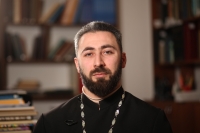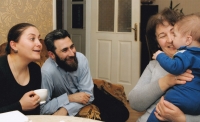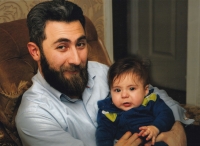On February 10th, [20]22, we went to Armenia with two of my friends, we decided to [spend] a week or two there, both to do some business and as a vacation. The family was here in Lviv. We went to Armenia, and the return ticket was for the morning of February 27th, we were supposed to take off at 10 in the morning. We were talking that it was going to begin now, and so on, we were in Armenia, traveling across the mountains, visiting friends, houses, and so on, the usual things, cooking shashlyk, relaxing. And on the 24th, at 10 or 9:30 in the morning, we were supposed to take off. All this began at night. Well, in the morning, we wake up, they are calling, saying, “This and that [has happened].” We wake up and still can’t believe it. Come on, what war? We call the airline, it was UIA [Ukraine International Airlines] back then, the UIA airline, which was flying, or SkyUP, SkyUp, the SkyUp airline was supposed to be flying. I remember the conversation, I directly called the airline, and said, “Is the flight happening or not? Because you said, we are watching the news that Ukrainian airspace is closed, planes aren’t flying, they will not fly.” And the young woman on the phone says, “Mister, what flight, don’t you understand what is going on? There is war here.” And that airline employee is crying on the phone. Then, we definitely understood that that was it. We started looking for ways [to return] on our own. All three of us have families, my friend does and I have a family here, and the third friend has a family in Kharkiv itself, he saw the photos that APCs and so on were already driving near his house. He was going already going insane there. And… And we are citizens of Armenia by passports. If there were no direct flights to Ukraine, there were flights through… through Europe, Poland and so on. And we need a visa, they won’t let us in just like that. And you can’t get a multivisa or a transit visa in two days to come there. And it happened so that in the first months of the war the three of us stayed there, while our families were here. We were looking for ways to come here because it wasn’t possible to do it through Moldova or through Turkey, there were no direct flights from Armenia to Moldova. It wasn’t possible to [travel to Ukraine] from Belarus, too, it was impossible [to get to] Minsk. Everything else was already Europe. We didn’t have a visa, and with the help of our ambassador here, through the church diocese, the ambassador helped us get a transit visa in the Polish consulate in Armenia and come to Poland a month after the war began. We flew to Poland and then entered Ukraine. All this time, [our] families were here, [we] wanted to get my wife and children out [of the country]. But my wife didn’t want to, she remained here. She is still here, she hasn’t left since the beginning of the war.


